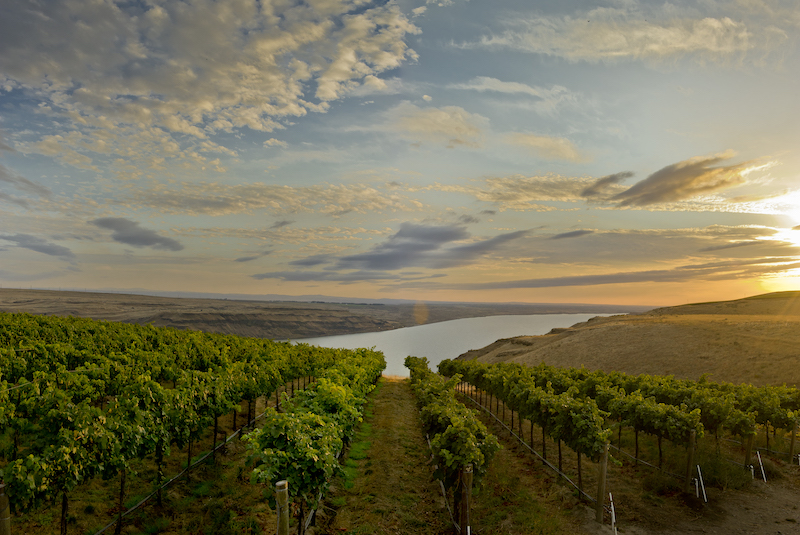
By Melissa Hansen
It’s a new era for winemaking. Long the domain of craftsmen and connoisseurs, scientists worldwide are utilizing new technologies and combining forces to create better wines. In fact, Washington State University (WSU) has an entire program dedicated to the science of wine.
Winemaking involves a host of scientific disciplines, including plant physiology, meteorology, agricultural engineering, plant pathology, entomology, chemistry, microbiology, and consumer science. Grape growers must know how the soil and climate will affect the fruit, and they must implement the latest techniques for preventing the spread of pests and disease. Even seemingly simple things, such as knowing when and how much to irrigate, requires scientific precision in order to grow high quality fruit while conserving resources.
Washington State may not seem like an ideal place to grow grapes. Most people think of rainy Seattle and evergreen forests, but that’s less than half of the state. Much of the rest, east of the Cascade Mountains, has a semiarid steppe climate – perfect for winemaking. According to Wines & Vines, Washington State produces 5% of the nation’s wine, which places it second only to California. (California is quite the behemoth, however: It produces 86% of the nation’s wine.)
 The science of wine is a big deal in Washington State. The state’s growers and winemakers directly fund projects at WSU. Ultimately, our goal is to improve quality and to create distinct wines with unique flavor profiles while having a minimal impact on the environment. We believe the research at WSU has the potential to change winemaking practices all over the world. For example, past research projects have helped growers and winemakers reduce inputs to manage pest and diseases, significantly reduce pesticide usage, improve soil health and nutrition, prevent wine spoilage, and manage phenolic compounds in winemaking.
The science of wine is a big deal in Washington State. The state’s growers and winemakers directly fund projects at WSU. Ultimately, our goal is to improve quality and to create distinct wines with unique flavor profiles while having a minimal impact on the environment. We believe the research at WSU has the potential to change winemaking practices all over the world. For example, past research projects have helped growers and winemakers reduce inputs to manage pest and diseases, significantly reduce pesticide usage, improve soil health and nutrition, prevent wine spoilage, and manage phenolic compounds in winemaking.
One of the more significant research projects in Washington State that resulted in both improved red wine quality and a boost to environmental sustainability involves deficit irrigation. Deficit irrigation, which has been widely adopted by Washington growers, is a management technique that applies less water early in the season than the vine normally uses but gives the vine adequate water during ripening. Research shows that early season vine stress results in smaller berries compared to conventional irrigation practices. Small berries are desired by winemakers because more color pigments and tannins can be extracted from the fruit. Vine stress also helps control canopy growth for improved sun exposure, and it reduces unripe, green flavors in red wine. As a bonus, deficit irrigation can reduce water consumption by up to 50 percent.
For white grape varieties, WSU scientists are currently evaluating a strategy that alternately stresses one side of the vine and then the other by partially drying the root zone, a technique that could help control vine vigor and improve water use efficiency while enhancing white wine quality. Another project examines a novel, below-the-ground water delivery system which reduces the amount of water lost by evaporation and also leads to fewer weeds.
To better understand aroma and flavor, WSU scientists also study wine chemistry and microbiology, such as the changes that occur during the ripening and aging processes and the microbial populations that change grape flavors into wine flavors. Chemists focus on how the thousands of molecules that make up wine affect our sensory perception, and microbiologists work on minimizing spoilage due to the presence of undesirable microbes and encouraging the growth of desirable ones. Additionally, we are developing analytical tools to help winemakers monitor conditions in real-time.
In the 21st Century, winemaking is both art and science. We can all raise a glass to that.
Melissa Hansen is Research Program Manager for the Washington State Wine Commission, which works in collaboration with Washington State University’s Viticulture and Enology program.


